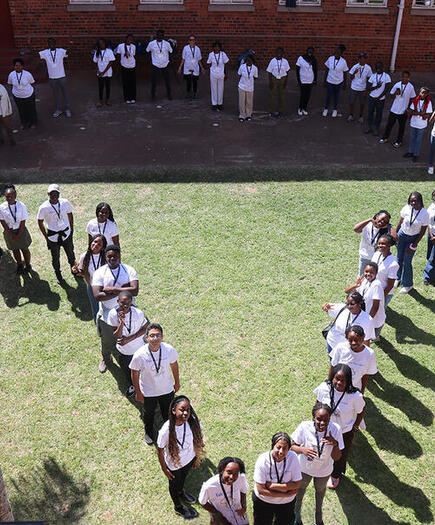Yale Young African Scholars program returns to in-person sessions


Over the summer, secondary school students from across Africa engaged in the Yale Young African Scholars academic enrichment program. With the successful relaunch of the residential program, after having entirely online programming since the beginning of the pandemic, 48 students from 20 different African countries convened in Harare, Zimbabwe from August 11-18. An additional 243 students from 30 different African countries participated in the online session, which took place from July 30 to August 5.
The programs gave students a taste of college-level courses, challenged them to learn about and refine their opinions on key regional and global issues, introduced them to peers with diverse interests, cultivated intellectual curiosity, and prepared students for the university application process. Through seminars taught by undergraduate and graduate student instructors, from institutions such as the University of Michigan, Columbia, Swarthmore, Tufts, and Yale, students engaged with critical topics and shared their insights. Many seminars included topics relating to the United Nations Sustainable Development Goals, such as Foreign Aid in Africa, Afro-Innovation, and Water for Wellness.
Additionally, the YYAS team hosted Zimbabwean educators for a professional development conference while in Harare, equipping them with additional skills and tools to prepare their students for the college application process and the transition to tertiary education. Yale Young African Scholars is also part of the HALI Access Network, which works collectively to provide access to educational resources for high achieving, low-income students in Africa.
During the program, students reflected on how concepts within the courses manifest differently in various African contexts, leading to broader understanding of multidisciplinary global issues. “There’s many perspectives built into the program itself,” YYAS Associate Director Ryan Pakebusch said. “Social change looks very different in a Cameroonian context, compared to a Nigerian or South African or Kenyan framework, based on student experiences and on the collective history of those nations.”
Abigail Ndikum, a Yale College senior who served as the YYAS Program Operations Intern this year, previously taught a YYAS course on social movements on the continent. Her course referenced ongoing political phenomena, such as the Anglophone crisis in Cameroon and the #EndSARS movement in Nigeria. “My goal with bringing in these topics was to challenge students’ thinking and situate them in the African context,” she said.
Extensive and vigorous discussion in class sessions fostered an environment that prompted students to further develop their existing academic interests, learn more about novel topics, and express their thoughts and opinions to their peers. Thembi Gausi, a Yale College senior and YYAS program instructor, said that supportive YYAS classroom environments helped foster the formation of opinion about critical global issues, which “allowed students to recognize the importance of self-expression in academic spaces.”
According to Gausi, the seminar format of instruction allowed students to gain familiarity with American educational spaces, “bridging gaps between very talented African high school students and higher education in the U.S.” Ndikum concurred, adding that students stepped out of their academic and social comfort zones during the program and built lasting and meaningful relationships with their fellow participants.
Through facilitated inquiry on key issues, students worked on their 21st century learning skills, equipping them to further engage in these interests after the program’s conclusion. YYAS instructors likened the program to existing capacity-building programs, reflecting on how the program expands on the talent, knowledge, and interests of African youth. Instructors designed course curriculum, helped students navigate the common application and other aspects of the American university application process, and led discussion sections. Students also collaborated on social impact projects to implement in their communities following the program.
After the program, students will also engage in a mentorship arrangement with undergraduate and graduate students affiliated with Yale Young African Scholars, receiving crucial guidance on the application process for global universities.
~~
To learn more, visit the YYAS website.
